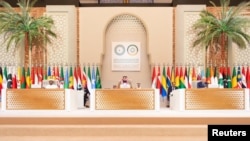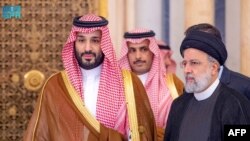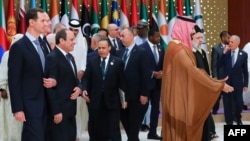The emergency meeting of the Arab League and the Organization of Islamic Cooperation (OIC) comes after Hamas militants' bloody October 7 attacks that Israeli officials now say left about 1,200 people dead from its initial 1,400 — mostly civilians — and 239 taken hostage.
Israel's subsequent aerial and ground offensive has killed more than 11,000 people — also mostly civilians and many of them children — according to the Hamas-run health ministry.
Host Saudi Arabia "confirms that it holds the occupation (Israeli) authorities responsible for the crimes committed against the Palestinian people," Crown Prince Mohammed bin Salman, the Gulf kingdom's de facto ruler, said as Saturday's summit began.
"We are certain that the only way to guarantee security, peace and stability in the region is to end the occupation, siege and the settlements," he said of Israel's actions in Gaza and the occupied West Bank.
Iranian President Ebrahim Raisi — on his first trip to Saudi Arabia since the two countries mended ties in March — said Islamic countries should designate the Israeli army a "terrorist organization" for its conduct in Gaza.
Israel said it is out to destroy Hamas and blames the Palestinian armed group for the high death toll, accusing it of using civilians as "human shields" — a charge Hamas has denied.
The Arab League and the OIC — a 57-member bloc that includes Iran — were originally meant to meet separately.
Arab diplomats told AFP the decision to merge the meetings came after Arab League delegations failed to reach an agreement on a final statement.
Some countries — including Algeria and Lebanon — proposed responding to the devastation in Gaza by threatening to disrupt oil supplies to Israel and its allies as well as severing the economic and diplomatic ties that some Arab League nations have with Israel, the diplomats said.
However, at least three countries — including the United Arab Emirates and Bahrain — which normalized ties with Israel in 2020 — rejected the proposal, according to the diplomats who spoke on condition of anonymity.
Syrian President Bashar al-Assad said a lack of concrete punitive measures against Israel would render the summit toothless.
"If we do not have real tools for pressure, then any step we take or speech we give will have no meaning," said Assad, who was welcomed back into the Arab fold this year after an extended rift over his country's civil war.
He said no Middle Eastern country should engage in any "political process" with Israel, including developing economic relations, until a lasting ceasefire is reached.
Israel and its main supporter — the United States — have so far rebuffed demands for a cease-fire — a position that drew heavy criticism on Saturday.
"The U.S. has prevented the cease-fire in Gaza and is expanding the scope of the war", Raisi said before departing from Tehran.
Turkey's President Recep Tayyip Erdogan said at the summit that "it is a shame that Western countries, which always talk about human rights and freedoms, remain silent in the face of the ongoing massacres in Palestine."
Palestinian president Mahmud Abbas said Washington had "the greatest influence on Israel" and "bears responsibility for the absence of a political solution" to the conflict.
Attendees at Saturday’s summit also included Egyptian President Abdel Fattah al-Sisi and Qatar's Emir Sheikh Tamim bin Hamad Al-Thani, who called for "deterrent steps to stop the ongoing war crime" in Gaza, without going into detail.
Raisi is the first Iranian president to visit Saudi Arabia since Mahmoud Ahmadinejad attended an OIC meeting in the kingdom in 2012.
In addition to addressing the summit, he held a face-to-face meeting with Prince Mohammed, Saudi state media said on X, formerly Twitter.
Iran backs Hamas, the Palestinian militant group, as well as Lebanon's Hezbollah and Yemen's Houthi rebels, placing it at the center of concerns the war could expand.
The conflict has already fueled cross-border exchanges between the Israeli army and Hezbollah, and the Houthis have claimed responsibility for "ballistic missiles" the rebels said targeted southern Israel.
Analysts say Saudi Arabia feels vulnerable to potential attacks because of its close ties with Washington and the fact that it was considering normalizing ties with Israel before the war broke out.











Forum